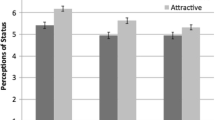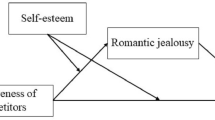Abstract
This study develops and begins to test the hypothesis that considerations of romance and sexual attractiveness may impede women’s expression of political ambition (in the sense of either interest in holding public office or willingness to disclose such interest). As this is a very new area of research, and as the subject is difficult to test, this study does not draw firm conclusions, but the initial data results suggest at least some support for the hypothesis. It does seem from these two experiments that politics makes one less popular as a date or mate choice, and that women who hypothetically hold office would be less likely to reveal that fact to a potential sexual or romantic partner. Further research is needed to both develop the measurements for this exciting new area of study and confirm these initial results.




Similar content being viewed by others
Notes
To be eligible to take the survey, participants had to live in the US, be over age 18, and have a 95% approval rate for previous tasks completed through Mturk. Subjects were only permitted to complete the survey once.
The complete text of the survey instrument is available upon request from the authors.
The survey instrument and photos are available upon request from the authors.
References
Berinsky, A. J., Huber, G. A., & Lenz, G. S. (2012). Evaluating online labor markets for experimental research: Amazon. com’s Mechanical Turk. Political Analysis, 20(3), 351–368.
Bower, C. L. (2003). Public discourse and female presidential candidates. In R. P. Watson & A. Gordon (Eds.), Anticipating madam president (pp. 107–116). Boulder, CO: Lynne Rienner Publishers Inc.
Bowles, H. R., Babcock, L., & McGinn, K. L. (2005). Constraints and triggers: Situational mechanics of gender in negotiation. Journal of Personality and Social Psychology, 89(6), 951.
Bureau of Labor Statistics. (2012). Current population survey, table 3: employment status of the civilian non-institutional population by age, sex, and race.
Bursztyn, L., Fujiwaraz, T., & Pallaisx, A. (2017). Acting wife: Marriage market incentives and labor market investments. Working paper. Available online at http://scholar.harvard.edu/pallais/publications/acting-wife-marriage-market-incentives-and-labor-market-investments. Accessed 21 April 2017).
Calogero, R. M. (2004). A test of objectification theory: The effect of the male gaze on appearance concerns in college women. Psychology of Women Quarterly, 28(1), 16–21.
Carroll, C., & Sanbonmatsu, K. (2013). More women can run. Oxford: Oxford University Press.
CAWP (2016). Current numbers of women officeholders. Technical report, Center for American Women and Politics.
Faludi, S. (2009). Backlash: The undeclared war against American women. New York: Broadway Books.
Fels, A. (2013). Necessary dreams: Ambition in women’s changing lives. New York: Anchor.
Ferree, M. M. (2004). Soft repression: Ridicule, stigma, and silencing in gender-based movements. Research in Social Movements, Conflicts and Change, 25, 85–101.
Fisman, R., Iyengar, S. S., Kamenica, E., & Simonson, I. (2006). Gender differences in mate selection: Evidence from a speed dating experiment. The Quarterly Journal of Economics, 121, 673–697.
Fox, R. L., & Lawless, J. L. (2005). To run or not to run for office: Explaining nascent political ambition. American Journal of Political Science, 49(3), 642–659.
Fulton, S. A., Maestas, C. D., Sandy Maisel, L., & Stone, Walter J. (2006). The sense of a woman: Gender, ambition and the decision to run for congress. Political Research Quarterly, 59(2), 235–248.
Hibbing, J. R., & Theiss-Morse, E. (2001). What is it about Government that Americans Dislike?. Cambridge: Cambridge University Press.
Hillygus, D. S., Jackson, N., & Young, M. (2014). Professional respondents in non- probability online panels. In M. Callegaro et al. (Eds.), Online panel research: A data quality perspective (pp. 219–237). New York: Wiley.
Houvouras, S., & Carter, J. S. (2008). The F word: College students’ definitions of a feminist. Sociological Forum, 23(2), 234–256.
Huddy, L., Neely, F. K., & Lafay, M. R. (2000). Trends: Support for the women’s movement. Public Opinion Quarterly, 64, 309–350.
Kamber, V. (2003). Poison politics: Are negative campaigns destroying democracy?. London: Basic Books.
Lawless, J. L., & Fox, R. L. (2005). It Takes a Candidate. Cambridge: Cambridge Univ. Press.
Lawless, J. L., & Fox, R. L. (2012). Men rule: The continued under-representation of women in US politics. Washington, DC: Women & Politics Institute, American University.
Mansbridge, J., & Shames, S. L. (2008). Toward a theory of backlash: Dynamic resistance and the central role of power. Politics & Gender, 4(4), 623–634.
Mulvey, L. (1975). Visual pleasure and narrative cinema. Screen, 16(3), 6–18.
Mutz, D. C. (2007). Effects of “in-your-face” television discourse on perceptions of a legitimate opposition. American Political Science Review, 101(04), 621–635.
Nye, J. S., Zelikow, P., & King, D. C. (1997). Why people don’t trust government. Cambridge: Harvard University Press.
Patterson, T. E. (2002). The vanishing voter: Public involvement in an age of uncertainty. New York: Alfred A. Knopf.
Political Parity. (2014). Shifting gears: How women navigate the road to higher office. Report by Political Parity, a program of Hunt Alternatives Foundation. Cambridge, MA. Available online at https://www.politicalparity.org/research/shifting-gears/. Accessed 26 April 2017.
Saad, L. (2013). Gridlock is top reason Americans are critical of congress. Report by Gallup. Available online at http://www.gallup.com/poll/163031/gridlock-top-reason-americans-critical-congress.aspx. Accessed 8 May 2017.
Shames, S. (2017). Out of the running; Why millennials reject political careers and why it matters. New York: NYU Press.
Talbot, M. (2011). Comment: The public on the private. The New Yorker, 24.
Acknowledgements
The authors offer their sincere thanks to Chelsea Coccia and Annalisa Klein for research assistance and to various graduate advisors in the Harvard and Duke Departments of Government/Political Science.
Funding
This study was funded in part through small grants to the authors from their graduate Departments at Harvard and Duke Universities. This research was also supported in part by NSF Graduate Research Fellowship Grant 1106401. Any opinion, findings, and conclusions or recommendations expressed in this material are those of the author and do not necessarily reflect the views of the National Science Foundation. No research grants were received from companies.
Author information
Authors and Affiliations
Corresponding author
Ethics declarations
Conflict of interest
All authors declare they have no conflicts of interest.
Ethical Approval
All procedures performed in studies involving human participants were in accordance with the ethical standards of the institutional and/or national research committee and with the 1964 Helsinki declaration and its later amendments or comparable ethical standards. Informed consent was obtained from all individual participants included in the study, and all instruments were approved by an institutional review board. This article does not contain any studies with animals performed by any of the authors.
Rights and permissions
About this article
Cite this article
Shames, S.L., Frankel, L.L. & Farjood, N. Romance, Sexual Attraction, and Women’s Political Ambition: Initial Findings from Two Experiments. Sexuality & Culture 21, 1177–1196 (2017). https://doi.org/10.1007/s12119-017-9443-9
Published:
Issue Date:
DOI: https://doi.org/10.1007/s12119-017-9443-9




